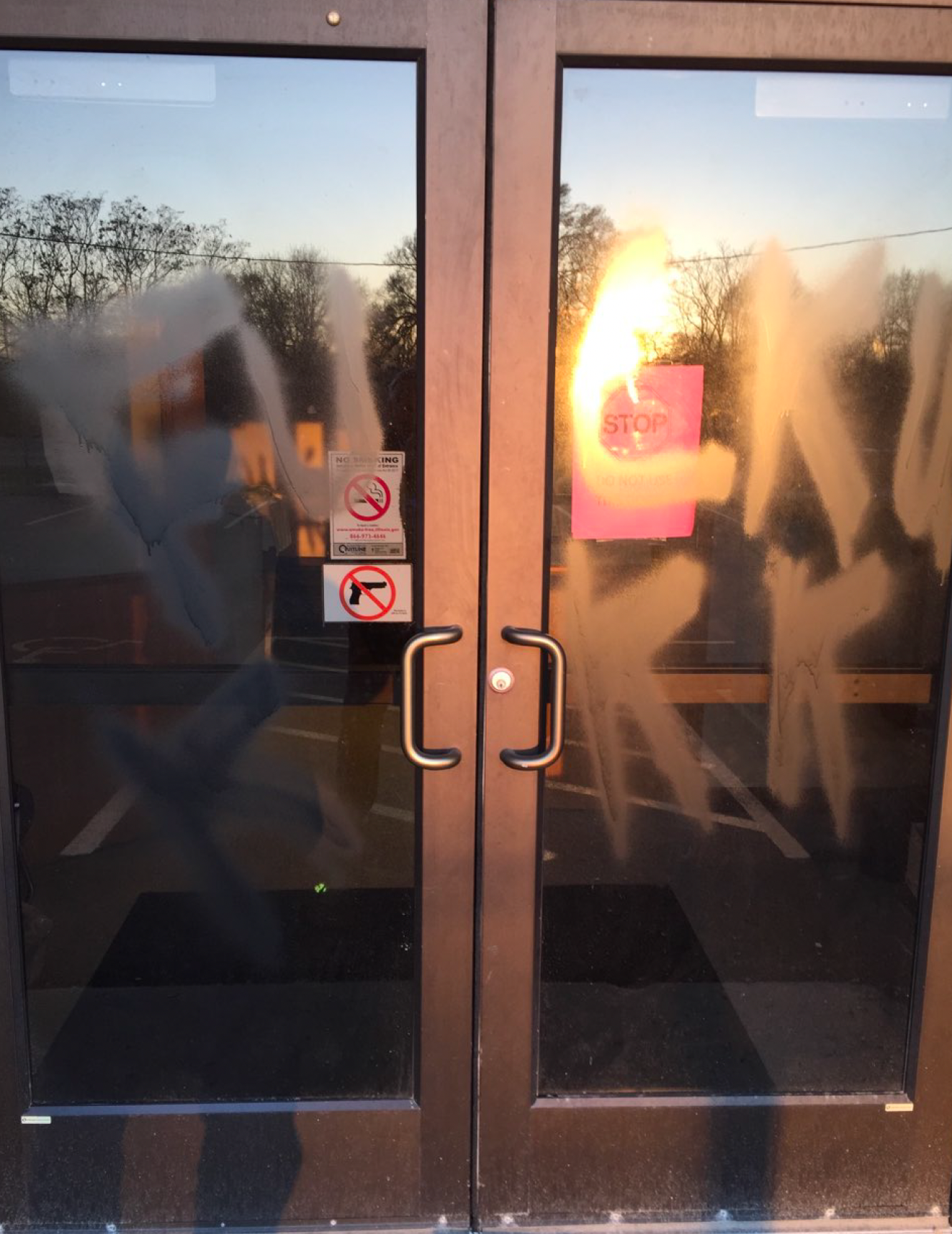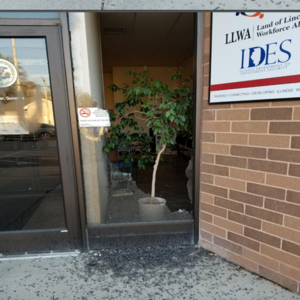IDES Kept Offices Closed While Many Struggled To Get Their Unemployment Benefits: What Really Happened Inside And Outside Those Walls
By Samah Assad, Carol Thompson, Tara Molina
CHICAGO (CBS) -- A worried call came into Peoria police dispatch on a rainy June 29 at 3:45 p.m. It was an officer working security at the local unemployment office.
"If we can get an officer," he asked. "I got the plate number of a car of a lady who threatened to blow up the building."
Recording of 911 call to Peoria police
The woman became agitated when she couldn't talk to someone about her unemployment benefits at the Illinois Department of Employment Security (IDES) office, police later wrote in a report. When asked to leave, she threatened she'd come back and "blow the place up."
IDES' offices have been closed to the public since the pandemic began. The closures came as thousands struggled to navigate a system that was understaffed, ill-equipped to deal with the scope of the problem and fraught with technical issues that prevented some from getting their benefits in a timely manner, or at all.
While lawmakers and members of the public questioned why offices were still closed after more than a year, state leaders said COVID concerns and threats were the reasons.
"There have been literally physical threats that have been brought up upon the people that work in IDES," Pritzker said when CBS 2 asked in May.
And in a statement in response to this story, an IDES spokesperson said closing offices for in-person services was "explicitly out of concern for the physical safety and safety of IDES claimants and staff" and the agency "has not wavered in this reasoning."
But what officials have said publicly doesn't tell the full story, a CBS 2 investigation found. Internal emails and records obtained by CBS 2 reveal, while other state unemployment offices found ways to reopen to the public, IDES struggled to devise a plan that balanced safety and delivering benefits amid a devastating jobs crisis.
As some IDES offices have reopened on an appointment-only basis, none are fully open to the public 17 months into the pandemic.
People in Need, A Timeline of Threats
Laid off this spring due to the pandemic, Lori Sparano said she called IDES dozens of times for help with her unemployment claim. After dealing with a fraudulent claim months prior, she said IDES had incorrectly deemed her legitimate claim fraudulent – an issue others have experienced too.
Because the offices were closed, she, like many others, didn't have the option of getting help in person. Typically, pre-pandemic, someone could easily prove their identity in person without the need to navigate the problem on the phone or online.
"When you're on the phone, you're hoping it's being handled," Sparano said. "And then two weeks ago by, four weeks go by, six weeks go by, and still nothing has been done.
"My husband's on a pension," she added. "If he didn't have a little part-time job, I would've lost my house."
She isn't alone. Being laid off during the pandemic was the story of nearly 4 million people in Illinois. CBS 2 found it also drove some to try and get help from IDES in person, and in some cases, in ways that put staff at risk.
A review of incident reports, 911 calls, photos and internal emails offer a glimpse into the lengths some went to after they couldn't get through to the agency. During that time, many who said they were desperate and struggling to make ends meet turned up to the offices and, when they couldn't get help in person, some resorted to aggression and violence, including making multiple bomb threats.
Citing active investigations, the state initially declined to release specifics on the security concerns, including where they happened, despite questions from the public. For the first time, CBS 2 pieced it together by building a database of incidents from the more than 60 Freedom of Information Act (FOIA) requests to local police departments and IDES.
On April 10, 2020, IDES documented the first incident at an office in Springfield. A supervisor reported the front door was shattered, and both front and back doors were graffitied with obscenities.
The previous week, more than 140,000 people filed for unemployment – an unprecedented number that's 18 times higher than what was filed the same week in 2019. With a system not built to handle a volume of claims and calls of this nature, IDES struggled to keep up. At that time, there was also no way for people to apply for new federal unemployment benefits in Illinois.


Over the next 16 months, offices remained closed. More than 50 security incidents would take place across the state, according to CBS 2's analysis. Claimants threatened to bomb offices via phone and in person if they didn't get the help they needed; some vandalized the properties by urinating on the building or pouring oil in the claimant drop box; and one person approached an employee at their home asking for help.
On June 29, 2020, one man at the Burbank office "became irate" when he was told the offices were closed and "donkey kicked the front entrance glass door," shattering it, a police report said.
One threat in September of 2020 was serious enough for IDES to send a warning letter to the claimant, informing the person they could be banned from the offices or criminally charged if the threats continued. The letter said the person was "hostile and made threats" toward employees at the Ottawa office during a phone call.
"You stated multiple times that you had 'nothing to lose' in a threatening and combative manner," the letter said.
Serious incidents, including most bomb threats, continued to happen in 2021, through the spring and summer.
In February, nearly one year after the unemployment crisis began, weekly claims were still at a high. The backlog of phone numbers in the state's callback queue hit their peak, with more than 150,000 waiting for a call back from IDES.
On Feb. 1, one man came to the Arlington Heights office and would not stop banging on the door, the report said. He swore and made racist comments to the security guard. The report also said he spit at the officer.
On April 19, an employee sent an email to supervisors to report a "furious, abusive" claimant, who said if the offices didn't open "he is going to pop off on someone," according to an internal email. "He was volatile and shook me up," the employee wrote.
Experts acknowledge handling security issues, especially during a pandemic, is difficult for any public agency. With three decades on the force, retired Aurora Police Chief Kristen Ziman is familiar with threats like the ones at IDES buildings.
"There are times when people cross the line and they become a threat, either to someone's personal safety or property, and so that's where you have to have measures in place," Ziman said, drawing on her personal experiences handling previous threats to Aurora City Hall.
"People are emotional, and they're frustrated because these are resources that the public is expected," she said regarding unemployment benefits. "And when people are denied those resources, it's understandable that people are emotional."
While she said the behavior of those behind the threats cannot be condoned, she believes it's an agency's responsibility to come up with a plan – one that balances both safety and serving the public.
"You're perpetuating the problem when you're withholding services, so there has to be a sweet spot – the balance between providing those services and keeping people safe," Ziman said.
That's what other states did, CBS 2 found. State unemployment agencies in Oklahoma and Mississippi said they didn't experience security incidents during the pandemic and were both able to reopen. Oklahoma fully reopened in June, and Mississippi was always open for remote appointments and fully reopened in April. California offices have been available for virtual services including video chats since Fall of 2020 and resumed in-person meetings by appointment earlier this year.
The Illinois Secretary of State's Office also said it experienced 25 security incidents during the pandemic, only closing offices on a temporary basis due to COVID-19 concerns. They currently provide walk-in services.
"At some point you have to figure out what the problem is and solve the problem, or else this is the definition of insanity – to continue to do the same thing," Ziman added.
Lack of Transparency
CBS 2 filed a FOIA request for internal emails to better understand how the agency was handling both security threats and reopening plans. While the agency publicly cited the security incidents for the closures, the emails raise questions about how well they were keeping track.
A group of managers and other staff sought a list of incidents in an email thread in December of 2020. After a manager sent the document to the group, including to IDES Director Kristin Richards, she replied on December 31, "I don't believe this to be exhaustive."
It wasn't. The list showed just eight incidents between April 10 and October 23, 2020. But when cross referenced with police reports, CBS 2 identified at least 20 incidents in that timeframe through records requests, indicating there are likely more incidents than were formally documented or released to CBS 2 through its FOIA request.
Sources inside IDES described incidents that occurred in 2020 that don't appear to be documented by IDES.
That includes what one employee described as a physical altercation in the parking lot.
"An individual did block my way from leaving the office," the employee said under the condition of anonymity. "They did physically stop me from leaving. That, in itself, was very frightening for us and for other individuals in our office."
CBS 2 asked an agency spokesperson why some incidents were not documented by IDES but did not receive a response.
"I know that not every incident was reported," the source said.
Fast forward to May 2021, more than a year into the pandemic, and questions about tracking continued. An email from a governor's spokesperson on May 12 asked, "Can we pull whatever back-up we have for security issues … clips on attacks, email threats…?"
Later in the thread: "Isn't there a spreadsheet of documented threats somewhere?" an IDES spokesperson asked, raising questions about how and to what extent the data was being collected.
"You have to analyze the problem before you devise a response, an action," Ziman said. "And so it is of the utmost importance that you collect the data."
Lawmakers also said they struggled to get answers from the agency. In an email on Jan. 22, 2021, State Rep. Kelly Cassidy contacted IDES on behalf of a constituent who was a victim of domestic violence and whose benefits were stopped while she was in the hospital with a broken nose. She couldn't get the issue resolved.
"As a survivor of domestic violence and a long-time advocate for survivors, the idea that this woman is in an even more vulnerable place than before as a result of her loss of benefits is incredibly upsetting," Cassidy wrote.
And because IDES failed to share specifics about the security incidents that occurred, many didn't know why the offices were still closed more than a year later. That includes State Rep. Joe Sosnowski.
"And what it turns out to be, after you've showed the cases, many of them were just irate people upset that they couldn't get questions answered," he said.
With his office fielding hundreds of unemployment related calls, he told us he contacted IDES on behalf of those concerned constituents many times about its reopening plans. With no response, he filed a formal resolution in May of 2021, calling on offices to reopen. The bipartisan resolution passed unanimously.
But internal emails from that month show IDES still hadn't nailed down its reopening plans, more than a year into the pandemic.
On May 11, an IDES spokesperson sent an email to other state unemployment agencies looking for guidance on reopening.
"If you reopened, what did it look like?" she asked. In response, IDES learned some states like Mississippi had already fully reopened to the public.
Threats to IDES continued. Two days later, on May 13, the threats continued. An employee at the Chicago Woodlawn office took a call from an "irate claimant" who experienced issues with backdating his claim. The caller told the employee he "couldn't wait for offices to open back up because you b**** gonna get blowed up."
And on June 4, while still working on a plan, the spokesperson sent an email to her counterpart in California's Employment Development Department (EDD) "to discuss reopening," but made it clear IDES wanted to keep it quiet.
"We're in the process of planning a phased reopening and would be interested in talking to states who have done this on the DL," or down low, the spokesperson wrote.
"Public agency, paid for by taxpayer dollars, in a representative democracy, and they want to not share plans with anybody," Sosnowski said. "It's just unfathomable."
An IDES spokesperson did not answer specific questions sent by CBS 2 for this story, including why the agency chose not to share more details with the public about the security incidents and its reopening plans. In part, a statement from the agency said:
"Like most things related to unemployment insurance, reopening offices to the public was not as simple as flipping on a switch, as seems to be the general misunderstanding. The planning surrounding the restoration of in-person services was complex and methodical, taking into account many variables, top of mind which were both health and safety related to claimants (Covid and physical threats to the offices and employees)."
More than 40 offices across the state offer some level of IDES services, from unemployment insurance help to workforce development. As of Sept. 20, the 18 IDES offices in American Job Centers that offer unemployment insurance assistance have reopened for scheduled in-person appointments, as part of a gradual reopening that began on Aug. 26. None are fully open to the public. IDES also said the other offices are leased by workforce partners and the agency does not control their opening schedule.
Sosnowski is concerned the partial reopening isn't enough.
"They've announced a partial reopening of a handful of offices, and they only take care of a handful of cases – they're still directing people to phone-in service," he said.
"It's really an embarrassment to the taxpayers. We pay hundreds of millions of dollars on that department, and they should be able to serve the public in an open and fair and transparent manner," Sosnowski added.
Lori Sparano said she finally got through to someone at IDES who could help her, not through the agency's callback option, but via repeated calls and emails to the office of her state representative, Brad Stephens.
After waiting more than three months, she started receiving her benefits Tuesday.
"Without Brad Stephens getting involved, his office, I don't think this ever would have been over," she said.
While she said she was able to find a way to make ends meet during that time she spent waiting, she knows it's a different story for others.
"These offices need to be open for people…they're losing everything they have," Sparano said. "Please open your offices."
Click here for information on how to schedule an in-person appointment at an IDES office.

CBS 2 is committing to Working For Chicago, connecting you every day with the information you or a loved one might need about the jobs market, and helping you remove roadblocks to getting back to work.
We'll keep uncovering information every day to help this community get back to work, until the job crisis passes. CBS 2 has several helpful items right here on our website, including a look at specific companies that are hiring, and information from the state about the best way to get through to file for unemployment benefits in the meantime.



